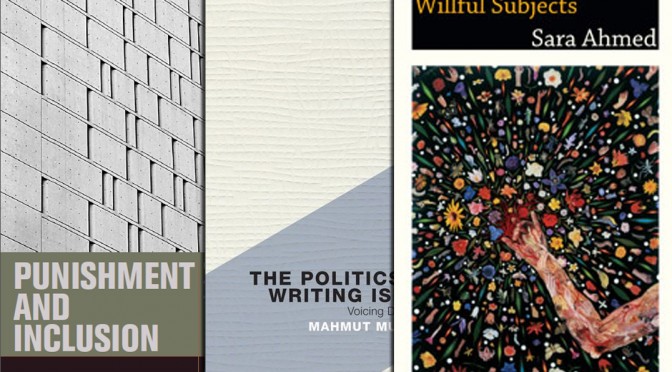Over the last few weeks, over 2,000 votes were cast for the best critical theory book of 2014. Here are the top 5 books of 2014, chosen by you. You can see all the results here.
#5 Punishment and Inclusion
by Andrew Dilts (4.7% of all votes)
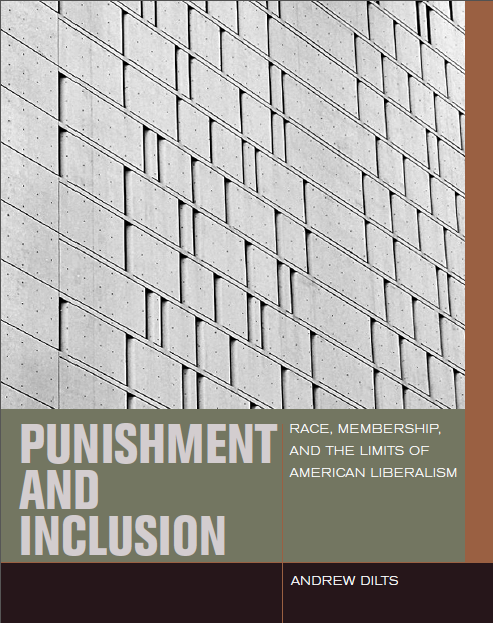 “With remarkable regularity, felon disenfranchisement–the restriction of voting rights for individuals convicted of certain criminal offenses–is analyzed and denounced by political theorists and philosophers. The practice, they rightly observe, is at odds with basic principles of liberal proportionality, republican conceptions of civic education, and any accepted penological ends. And yet, it persists throughout the United States, continuing to shape the outcome of political contests, and asserting itself each and every time Americans line up at the voting booth. What larger lessons does the fact of felon disenfranchisement’s persistence teach us about American law, politics, and principles?
“With remarkable regularity, felon disenfranchisement–the restriction of voting rights for individuals convicted of certain criminal offenses–is analyzed and denounced by political theorists and philosophers. The practice, they rightly observe, is at odds with basic principles of liberal proportionality, republican conceptions of civic education, and any accepted penological ends. And yet, it persists throughout the United States, continuing to shape the outcome of political contests, and asserting itself each and every time Americans line up at the voting booth. What larger lessons does the fact of felon disenfranchisement’s persistence teach us about American law, politics, and principles?
Punishment and Inclusion argues that the particular history of felon disenfranchisement, rooted in post-slavery restrictions on suffrage and the contemporaneous emergence of the modern American penal system, shows the deep connections between two American political institutions often thought to be separate, revealing the work of membership done quietly by our criminal justice system, and, conversely, the work of punishment done by the electoral franchise. By treating disenfranchisement as a symptomatic marker of the deep tension and interdependence that persists in democratic politics between who is considered a member of the polity and how that polity punishes persons who violate its laws, Punishment and Inclusion opens new critical perspectives on the philosophy of punishment, the institution of American citizenship, and the internal limits of liberal political theory. In doing so, it goes beyond existing scholarly accounts of disenfranchisement that primarily focus either on the question of its efficacy as a form of punishment, or on the question of the legitimacy of its restrictions on the franchise, without considering the relation between these issues, which is where felon disenfranchisement’s deepest significance lies.”
You can read the first chapter here for free. Buy it here.
#4 Mohawk Interruptus
By Audra Simpson (5.38% of all votes)
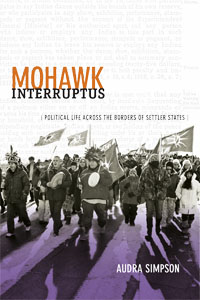
“Mohawk Interruptus is a bold challenge to dominant thinking in the fields of Native studies and anthropology. Combining political theory with ethnographic research among the Mohawks of Kahnawà:ke, a reserve community in what is now southwestern Quebec, Audra Simpson examines their struggles to articulate and maintain political sovereignty through centuries of settler colonialism. The Kahnawà:ke Mohawks are part of the Haudenosaunee or Iroquois Confederacy. Like many Iroquois peoples, they insist on the integrity of Haudenosaunee governance and refuse American or Canadian citizenship. Audra Simpson thinks through this politics of refusal, which stands in stark contrast to the politics of cultural recognition. Tracing the implications of refusal, Simpson argues that one sovereign political order can exist nested within a sovereign state, albeit with enormous tension around issues of jurisdiction and legitimacy. Finally, Simpson critiques anthropologists and political scientists, whom, she argues, have too readily accepted the assumption that the colonial project is complete. Belying that notion, Mohawk Interruptus calls for and demonstrates more robust and evenhanded forms of inquiry into indigenous politics in the teeth of settler governance.”
Buy it here.
#3 Willful Subjects
By Sara Ahmed (7.3% of all votes)
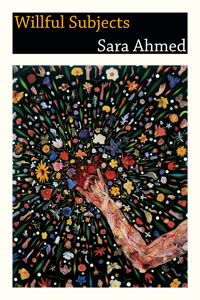 “In Willful Subjects Sara Ahmed explores willfulness as a charge often made by some against others. One history of will is a history of attempts to eliminate willfulness from the will. Delving into philosophical and literary texts, Ahmed examines the relation between will and willfulness, ill will and good will, and the particular will and general will. Her reflections shed light on how will is embedded in a political and cultural landscape, how it is embodied, and how will and willfulness are socially mediated. Attentive to the wayward, the wandering, and the deviant, Ahmed considers how willfulness is taken up by those who have received its charge. Grounded in feminist, queer, and antiracist politics, her sui generis analysis of the willful subject, the figure who wills wrongly or wills too much, suggests that willfulness might be required to recover from the attempt at its elimination.”
“In Willful Subjects Sara Ahmed explores willfulness as a charge often made by some against others. One history of will is a history of attempts to eliminate willfulness from the will. Delving into philosophical and literary texts, Ahmed examines the relation between will and willfulness, ill will and good will, and the particular will and general will. Her reflections shed light on how will is embedded in a political and cultural landscape, how it is embodied, and how will and willfulness are socially mediated. Attentive to the wayward, the wandering, and the deviant, Ahmed considers how willfulness is taken up by those who have received its charge. Grounded in feminist, queer, and antiracist politics, her sui generis analysis of the willful subject, the figure who wills wrongly or wills too much, suggests that willfulness might be required to recover from the attempt at its elimination.”
Buy it here.
#2 Red Skin, White Masks
By Glen Sean Coulthard (13.6% of all votes)
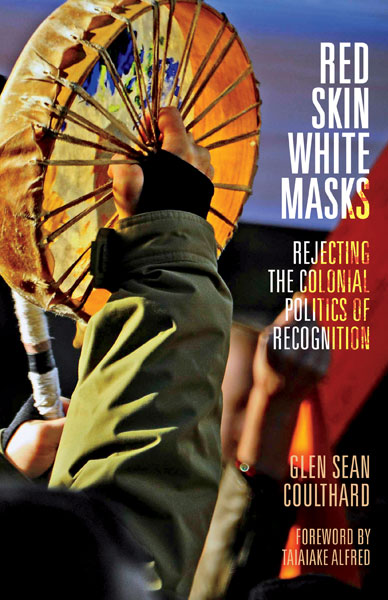
“Over the past forty years, recognition has become the dominant mode of negotiation and decolonization between the nation-state and Indigenous nations in North America. The term “recognition” shapes debates over Indigenous cultural distinctiveness, Indigenous rights to land and self-government, and Indigenous peoples’ right to benefit from the development of their lands and resources.
In a work of critically engaged political theory, Glen Sean Coulthard challenges recognition as a method of organizing difference and identity in liberal politics, questioning the assumption that contemporary difference and past histories of destructive colonialism between the state and Indigenous peoples can be reconciled through a process of acknowledgment. Beyond this, Coulthard examines an alternative politics—one that seeks to revalue, reconstruct, and redeploy Indigenous cultural practices based on self-recognition rather than on seeking appreciation from the very agents of colonialism.
Coulthard demonstrates how a “place-based” modification of Karl Marx’s theory of “primitive accumulation” throws light on Indigenous–state relations in settler-colonial contexts and how Frantz Fanon’s critique of colonial recognition shows that this relationship reproduces itself over time. This framework strengthens his exploration of the ways that the politics of recognition has come to serve the interests of settler-colonial power.”
Buy it here.
#1 The Politics of Writing Islam: Voicing Difference
By Mahmut Mutman (19.4% of all votes)
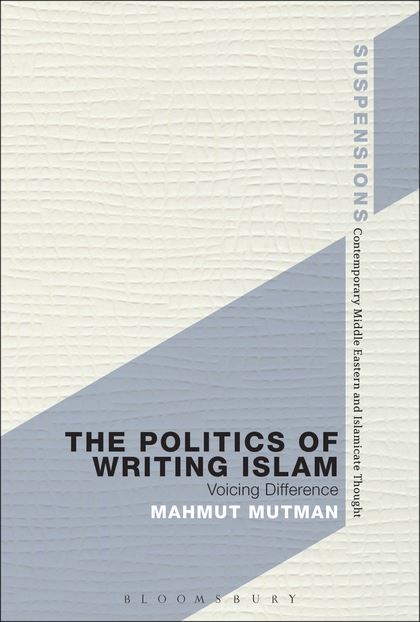
“The Politics of Writing Islam provides a much-needed critique of existing forms of studying, writing and representing Islam in the West. Through critiquing ethnographic, literary, critical, psychoanalytic and theological discourses, the author reveals the problematic underlying cultural and theoretical presuppositions. Mutman demonstrates how their approach reflects the socially, politically and economically unequal relationship between the West and Islam.
While offering a critical insight into concepts such as writing, power, post-colonialism, difference and otherness on a theoretical level, Mutman reveals a different perspective on Islam by emphasizing its living, everyday and embodied aspects in dynamic relation with the outside world – in contrast to the stereotyped authoritarian and backward religion characterized by an omnipotent God.
Throughout, Mutman develops an approach to culture as an embodied, everyday, living and ever changing practice. He argues that Islam should be perceived precisely in this way, that is, as an open, heterogeneous, interpretive, multiple and worldly belief system within the Abrahamic tradition of ethical monotheism, and as one that is contested within as well as outside its ‘own’ culture.”
Buy it here.

